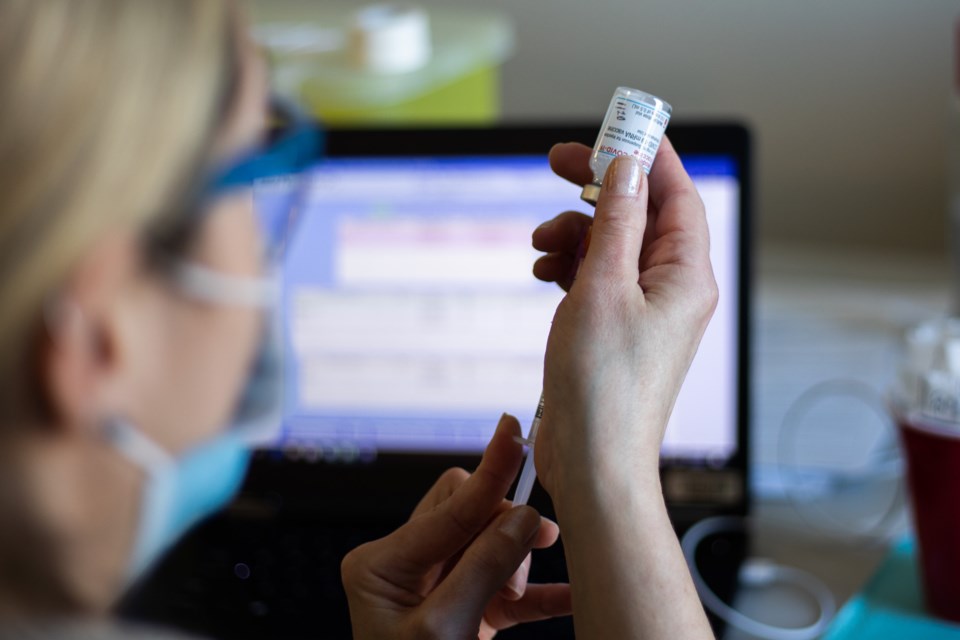An Okotoks woman is feeling safer after receiving her first COVID-19 vaccination, but she admits she has some concerns after further lessening of restrictions were announced last week.
“I was floored to see that COVID-19 positive patients, they won’t have to isolate (as of Aug. 16),” said Jasmine Paiment, who received her first vaccination on July 29 at the Foothills Centennial Centre. “That one really got to me.
“I will feel safer in a few weeks when everything (the vaccination) starts to kick in.”
Paiment, who delayed getting her first shot due to pregnancy (she recently gave birth), said she plans to get her second shot as soon as possible.
The dropping of some restrictions was announced by Dr. Deena Hinshaw, Alberta chief medical officer of health, on July 28.
As of July 29, close contacts of an individual with COVID-19 are no longer legally required to quarantine, unless directed to do so by local public health officials.
Further, as of August 16, individuals with COVID-19 symptoms and confirmed cases will not be required to isolate.
“Isolation will no longer be universally legally required if you test positive for COVID-19,” Hinshaw said. “Although it may be required in high-risk areas.”
She highly recommended that those who have tested positive, to self-isolate on their own accord.
It is also being recommended that those with mild symptoms not be tested, but those individuals should stay at home.
Testing will also be reduced at the end of the month.
"After Aug. 31, testing for COVID-19 will be available for patients whose symptoms are severe enough to need care in hospitals or physicians’ clinics,” she said. “It will be conducted when needed for informing treatment decisions and as needed for outbreaks in high-risk settings.”
Hinshaw added when students go back to school in the fall, masks will not be needed.
“At this time, we are not planning to require universal masking in schools,” Hinshaw said. “However, we will be recommending it as a temporary outbreak intervention in response to respiratory outbreaks.”
She admitted many parents, teachers and students will have questions. Therefore, a guidance document will be released in mid-August.
The president of the Alberta Medical Association, Dr. Paul Boucher, said in an open letter to members he had concerns about how quickly restrictions were being reduced.
“The pace at which public health measures are ending is troubling,” Boucher wrote. “I do not disagree that moving from pandemic state to endemic state is the future, but would strongly advocate for a less precipitous approach.
“This would allow the impact of removal of masking and public gathering restrictions, the increase in prevalence of the Delta variant and the upcoming return to in-person learning to be better understood. It would provide more safety for Albertans, manageability for the health care system and ease public anxiety during this transition.”
Hinshaw added getting Albertans fully vaccinated remains key in fighting COVID-19, particularly with the increase in the Delta variant.
“Vaccines dramatically reduce the risk of severe outcomes and the risk of infection,” Hinshaw said. “Since July 1, people who were not fully immunized made up 95 per cent of all cases of COVID-19; 94 per cent of all those who have needed hospital care for COVID-19 and 95 per cent of COVID deaths.
“Having two doses of vaccine has never been more important. The Delta variant spreads more easily and that second dose is critical for protection.”
As of July 29, there have been 5,294,361 doses administered in Alberta. Seventy-five per cent of those eligible for a vaccine, 12 years of age and over, have received at least one dose. That represents 64.5 per cent of the entire population.
In regards to being fully vaccinated, the number is 65 per cent of Albertans 12 years of age and older.
In Okotoks-Priddis area, 74 per cent of eligible individuals have received one vaccination and 65 per cent are fully vaccinated, (56.1 per cent all ages). For Turner Valley-Black Diamond-Longview area, 65.4 per cent of eligible recipients have one dose, 56.5 are fully vaccinated (49.4 of all ages). In High River-Nanton there are 68.8 per cent eligible with one dose and 59 per cent fully vaccinated (51.5 per cent all ages).
There is a vaccination clinic Aug. 5 at the Highwood Memorial Centre from 4 to 8 p.m. Another clinic is scheduled for Aug. 10 from 4 to 8 p.m. at Cayley School.
For vaccination information in other communities go to COVID-19 vaccine program | Alberta.ca




